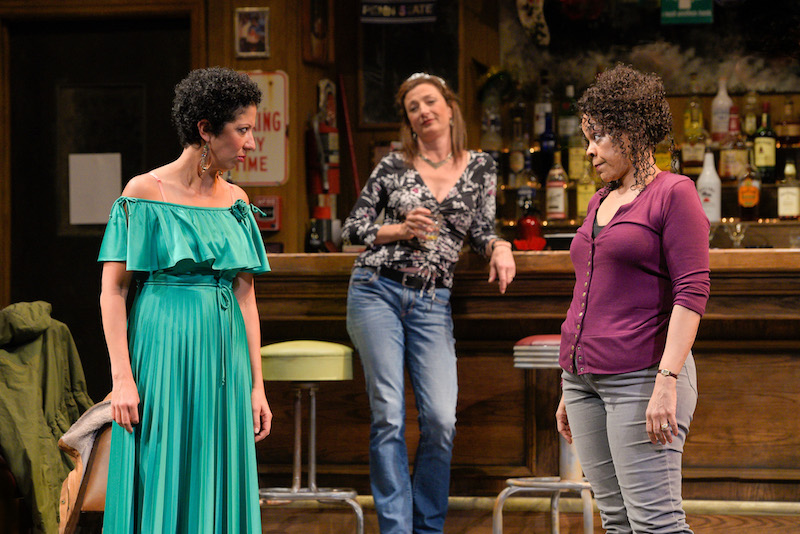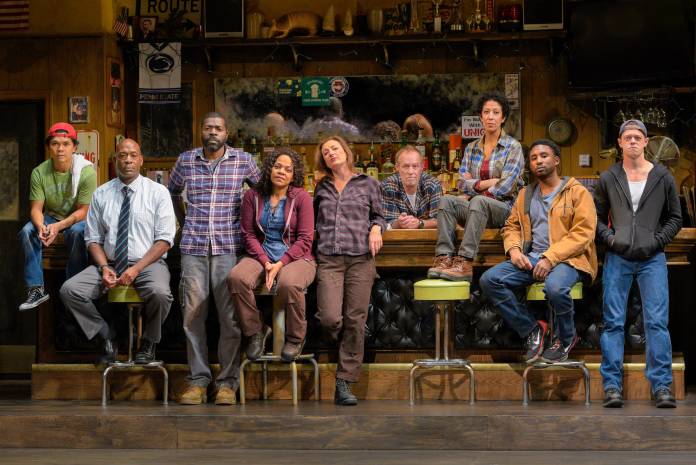ONSTAGE The tavern setting is a familiar trope for American theater and television—think Langston Hughes’ Simple series, Casablanca, The Iceman Cometh, or Friends. It offers both an intimate setting where habitués share their most intimate feelings, and a public place where issues of universal importance—like the economy, racism, addiction—can’t help but intrude. The doors are always open, so anyone can walk in, and sometimes they do, upsetting the whole equilibrium.
The local bar in Reading, Pennsylvania is the perfect place for Lynn Nottage’s Pulitzer Prize-winning play Sweat (through October 21 at ACT). Everyone there has a direct relationship to the local declining steel industry: Bartender Stan (Rod Gnapp) worked at the factory for almost three decades before a machine malfunction permanently injured his leg, a trio of women friends traditionally celebrate their birthdays there, their sons come in always hoping for some new kind of beer. Even the taciturn busboy Oscar (Jed Parsario) hopes to quit hauling cartons of booze and get a job at the mill one day.
Though the play was first produced in 2015 at the Oregon Shakespeare Festival and later at New York’s Public Theater, it’s hard to imagine a more talented, energetic, and tightly-knit ensemble than the cast in this ACT production.
The Brooklyn-based Nottage was sparked to write the play after visiting the Occupy Wall Street site in 2011 with a friend who was in financial straits. It led her to ponder, “Why suddenly do we have one percent which has so much wealth, and a majority that’s beginning to suffer in ways that we haven’t seen since the Depression.“

A Yale Drama School graduate, Nottage takes her research seriously. She won her first Pulitizer for Ruined, a play about women in war-torn Congo, which was inspired by her four-year stint at Amnesty International. For Sweat, she headed to the Rust Belt and interviewed women and men left behind when the steel plants were shuttered and moved overseas. She learned first-hand about the catastrophic impact the closing of the factories had on families who had worked in them for generations.
Director Loretta Greco, the artistic director the Magic Theatre and a long-time admirer of Nottage, had seen the Ashland production of Sweat and welcomed the opportunity to direct it at the Geary Theater when invited by ACT’s new artistic director Pamela MacKinnon. “I’m kind of a class warrior,” Greco said, “We so rarely have genuine pieces of work in our culture that deal with the working class, that recognize the beauty and dignity of what it is to really believe in hard work and your piece of that bigger American Dream.” She hopes the audience will “re-engage with this whole swath of people who have been marginalized through no fault of their own.”
Though almost the entire play is set in a neighborhood bar, Greco contextualizes the patrons’ personal dramas with the aid of dramatic black-and-white illuminated images of working steel mills and factories in decline. Scenic designer Andrew Boyce and production designer Hana S. Kim effectively intersperse news footage above the neon signs of the bar to remind audiences of NAFTA, Y2K, 9/11, the war in Iraq, and the economic crisis of 2008.
Nottage delves deeply into both the overt and the subtle racial conflicts in this working class community. The trio of women friends at the heart of the drama, two African American and one white, have all worked at Olstead’s Mill, a steel tubing plant, for more than two decades. They’ve shared life’s laughs and sorrows, gossiping and dancing to the jukebox in the bar for just as long. Tracey (Lisa Bruneau), Jessie (Sarah Nina Hayon), and Cynthia (Tonye Patano) are all bright and engaging—until outside pressures bring their flaws to the surface: Tracey can’t help blaming her troubles on immigrants and assuming she was passed up for promotion because she is white. Cynthia is so ambitious that she is willing to betray her fellow workers, including her best friends and her son, and Jessie’s retreat into alcohol often leaves her with her face planted on a barroom table.
Cynthia’s son Chris (Kadeem Ali Harris) and Tracey’s son Jason (David Darrow) are also friends who work at the steel plant. Chris is planning to go to college and become a high school teacher, while Jason, saving up for a powerful used Harley, tries to convince his friend that their futures are more financially secure at the plant. But when they discover that the owners have removed machinery in the middle of the night and try to force the workers to accept longer hours and pay cuts, both young men rally around the union’s attempt to fight the concessions.
Cynthia’s estranged husband Brucie (Chike Johnson) was locked out of the nearby textile plant for 93 weeks because workers there wouldn’t accept management’s offer of a 50% pay cut and the elimination of their retirement plan. Though he still tries to wake up in time to walk the picket line, he has sunk so deeply into drug addiction, that he tries to cadge money from his hard-working son and absconds with his wife’s presents and valuable tropical fish on Christmas Eve.
As the situation gets more desperate, Tracey and Jason reveal that the owners have put out Spanish-language leaflets offering up jobs at cut-rate wages. They blame the Latino workers—including Oscar—for crossing their picket line and stealing their jobs. Their accusations lead to disaster not only for them, but for Chris, Oscar, and bartender Stan.
The language is so colloquial—often downright vulgar—that it’s easy to believe you are overhearing barroom conversations. But Nottage does not shy away from the deeper, more nuanced problems her increasingly desperate characters face. She asks the tough question: When does class solidarity end and racism begin? When union loyalist Brucie feels ignored by his shop steward because he is black? When working class Tracey, who takes pride in the work of her German immigrant grandfather, accuses Oscar of “coming over” to take their jobs?
“The revolution I’m interested in,” Nottage explained, “is the one that’s happening right now. The revolution of de-industrialization.”
Nottage does not flinch from showing how decisions of distant capitalists slice deep gashes into the lives of the workers. It is painful to watch the actors sink under the weight of their hardship, frustration and anger. But if we cannot bear these truths from the stage, how will we ever begin to grapple with them in real life?
SWEAT
Through October 21 at ACT
Geary Theater, SF.
More info here.






